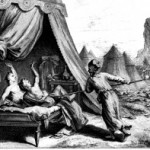Pinchas & peace – Pinchas
 The paradox of the parashah is why Pinchas who committed a public act of violence was rewarded with a covenant of peace (Num. 25:12), especially when, as the rabbis tell us, Moses warned him not to commit murder.
The paradox of the parashah is why Pinchas who committed a public act of violence was rewarded with a covenant of peace (Num. 25:12), especially when, as the rabbis tell us, Moses warned him not to commit murder.
The explanation lies in the circumstances. Pinchas was no fanatic but a peaceful and peaceable man. In rabbinic terms he was a tam, not a mu’ad – a person known for quietness, not for aggressiveness.
This was a unique occasion, however. The stability and character of the people were under threat from a brazen act of defiance. Let the transgression go unpunished, and the whole moral stability of the people would be finished. Someone had to step forward and take action. That person was Pinchas.
His lifetime dream was that no-one would ever lift up the sword against others (Isa. 2:4), but in the meantime he had the real world to contend with. Harmony would not be served by appeasement, only by unity in the renewed service of an ideal.
That is what turned Pinchas into a warrior and brought about his swift, decisive punishment of Zimri and Kozbi.
Was no-one else available to act? There must have been, but precisely because Pinchas was a man of peace he was the one who had to show the moral courage to act for the Lord.
Normally he would have lost his priestly status for stepping out of line, but God Himself championed the zealous warrior priest (“He was very zealous for My sake” – Num. 25:10-11) and assured him that his descendants would have the priesthood for generations to come.



